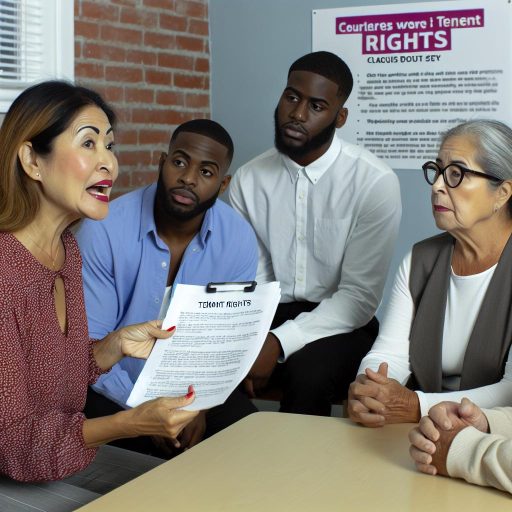Introduction to Landlord-Tenant Laws and Their Importance
Landlord-tenant laws play a crucial role in rental agreements.
They establish the rights and responsibilities of both parties.
Understanding these laws helps protect tenants’ rights.
Moreover, it ensures that landlords can manage their properties effectively.
These regulations address issues related to repairs and habitability.
The Need for Clarity in Rental Agreements
Clear agreements prevent legal disputes between landlords and tenants.
They specify who is responsible for repairs and maintenance.
Furthermore, clarity supports a stable rental relationship.
Significance of Habitability Standards
Habitability laws ensure rental units meet minimum living conditions.
These standards safeguard tenant health and safety.
Common issues include heating, plumbing, and electrical problems.
Legal Remedies for Repair Issues
Tenants have legal routes to address repair delays.
They can request repairs verbally or in writing.
If landlords fail to act, tenants might pursue further legal action.
Such actions can include withholding rent or seeking damages.
Preventive Measures for Landlords
Landlords can avoid legal problems by maintaining their properties.
Regular inspections help identify necessary repairs early.
Proactive communication with tenants fosters good relationships.
Additionally, keeping tenants informed about their rights is essential.
Implications of Understanding Landlord-Tenant Laws
Understanding landlord-tenant laws is vital for both sides.
It promotes smoother interactions and reduces conflicts.
Equipped with knowledge, tenants can ensure their dwellings are safe.
Meanwhile, landlords can maintain their properties and income.
Definition of Habitability and Its Essential Components
Habitability refers to the suitability of a residential property for living purposes.
A dwelling must meet specific health and safety standards to be considered habitable.
These standards address issues such as plumbing, heating, and electrical systems.
Additionally, habitability ensures that a property has adequate weather protection.
This includes functioning roofs, walls, and windows to prevent exposure to the elements.
Furthermore, structures should be free from pests and vermin infestations.
Habitability also requires safe access to clean water and sewage disposal.
Ultimately, these components aim to create a safe living environment for tenants.
Landlord-tenant laws often outline these requirements in detail.
Understanding these laws helps both parties navigate their rights and responsibilities.
Legal Responsibilities of Landlords Concerning Repairs
Understanding Habitability Standards
Landlords must ensure their properties meet basic habitability standards.
These standards include safe and secure structures.
Additionally, functioning utilities are essential for habitability.
Landlords are responsible for providing adequate heat, water, and electricity.
Moreover, they must ensure plumbing and drainage systems work properly.
Timeliness of Repairs
Landlords have a legal duty to address repair requests promptly.
They must prioritize repairs that affect tenant safety and comfort.
Failure to respond may result in legal action from tenants.
Tenants should document all repair requests for evidence.
Furthermore, clear communication channels can help expedite repairs.
Notification and Response Protocols
Landlords should establish clear protocols for reporting repairs.
Tenants must notify landlords of issues as they arise.
This could be through written notices or phone calls.
Landlords should acknowledge these notifications promptly.
They must provide timelines for when repairs will be made.
Legal Consequences of Neglect
Neglecting repair duties can lead to significant legal consequences.
Tenants have the right to withhold rent until repairs are made.
Additionally, they may seek compensation for any damages incurred.
In severe cases, tenants can report landlords to local housing authorities.
Landlords may face fines or legal actions for non-compliance.
Best Practices for Landlords
Regular property inspections can prevent repair issues.
Landlords should maintain positive relationships with their tenants.
Keeping open lines of communication fosters trust and understanding.
Timely repairs demonstrate a landlord’s commitment to their tenants.
Lastly, understanding local laws can help landlords stay compliant.
Explore Further: What Real Estate Buyers Need to Know About Title Insurance
Tenant Rights Regarding Repairs and Maintenance Issues
Understanding Tenant’s Rights
Tenants have specific rights regarding the condition of their rental units.
These rights often include the expectation of a habitable living environment.
Landlords must ensure that the property meets health and safety standards.
If a repair is needed, tenants have the right to request it in a timely manner.
Furthermore, tenants possess the right to live in a unit free from significant defects.
Responsibilities of Landlords
Landlords are responsible for maintaining the property in good condition.
This includes ensuring plumbing, heating, and electrical systems are functional.
Additionally, landlords must address issues like pest infestations promptly.
If a tenant reports a problem, landlords must act quickly to fix it.
Failure to make necessary repairs can lead to legal issues for landlords.
How to Report Repair Issues
Tenants should document any maintenance issues as they arise.
Taking photos or notes can serve as valuable evidence.
Next, tenants should notify their landlord in writing regarding the repair needs.
It’s advisable to keep a copy of the written communication for records.
If issues remain unresolved, tenants may contact local housing authorities.
Consequences of Inaction
When landlords neglect repairs, tenants have several options available.
Tenants might choose to withhold rent until the issue is addressed.
Alternatively, they may seek legal remedies through small claims court.
In some situations, tenants can arrange for repairs and deduct costs from rent.
Ultimately, it’s crucial for tenants to understand their rights and options.
Legal Protections for Tenants
Many states provide legal protections for tenants facing repair issues.
These laws often require landlords to maintain a habitable environment.
Additionally, regulations might protect tenants from retaliation for reporting issues.
Knowing the local tenant laws can empower tenants to advocate for their rights.
Consulting legal aid organizations can also provide valuable guidance.
Discover More: How Land Use Regulations Affect Real Estate Development Opportunities
Procedures for Reporting Repair Issues
Understanding the Tenant’s Role
Tenants play a crucial role in reporting repair issues.
Timely communication helps landlords address problems efficiently.
Each tenant should know their rights and responsibilities.
Understanding these can aid in maintaining a habitable environment.
Steps for Reporting Repairs
First, document the issue clearly and thoroughly.
Take photographs to illustrate the problem.
Next, notify your landlord in writing.
Email or certified mail adds a layer of proof.
Be specific about the nature and urgency of the repair.
Follow up if you do not receive a timely response.
Understanding Response Times
Landlords typically have a set timeframe to respond.
Depending on local laws, this timeframe can vary.
For urgent issues, immediate action is necessary.
Know the definition of urgent repairs in your jurisdiction.
Tenant’s Obligations
Maintaining the Property
Tenants must keep their living space clean and safe.
Preventative maintenance can reduce the need for repairs.
Report any issues as soon as they arise.
Taking prompt action helps everyone involved.
Understanding Rental Agreements
Read your lease carefully to understand obligations.
Most rental agreements outline repair procedures clearly.
Fulfilling your part maintains a positive landlord-tenant relationship.
Awareness of your lease terms can prevent misunderstandings.
Communicating with Your Landlord
Open communication establishes trust and accountability.
Regularly check in with your landlord regarding ongoing issues.
Developing a rapport can enhance the repair process.
Be respectful and patient, even when frustrations arise.
Uncover the Details: Tenant Screening And Fair Housing Laws: What Landlords Must Know
Legal Remedies for Tenants Facing Unresolved Repair Issues
Understanding Habitability Standards
Habitability standards ensure rental properties are livable and safe.
Landlords must provide essential services like plumbing and heating.
Tenants have the right to a property free from dangerous conditions.
States enforce these standards to protect tenant rights consistently.
Documenting Repair Requests
Tenants should document all repair requests made to their landlord.
Written communication creates a paper trail that can be useful.
Photographs of the issue can provide visual evidence of the problem.
Maintaining records of all communications is crucial for future action.
Exploring Legal Options
Several legal remedies exist for tenants facing unresolved issues.
Tenants can file complaints with local housing authorities.
They may also consider pursuing legal action against their landlord.
Consulting a tenant’s rights attorney can clarify available options.
Withholding Rent
Some tenants opt to withhold rent for unresolved repairs.
This approach requires specific conditions to avoid eviction.
Tenants must typically prove the landlord was notified of the issue.
Consulting legal guidance is advisable before taking this step.
Repair and Deduct Method
Another option is the repair and deduct method.
This allows tenants to make necessary repairs themselves.
Tenants may then deduct the costs from future rent payments.
Documentation of repairs and expenses is essential for this method.
Seeking Mediation or Arbitration
Mediation or arbitration can help resolve disputes amicably.
These alternative dispute resolution methods are often less formal.
They can save time and money compared to court proceedings.
Qualified mediators can facilitate agreements between both parties.
Filing a Lawsuit
If all else fails, tenants can file a lawsuit against their landlord.
This formal legal action may seek compensation for damages incurred.
Court actions can be lengthy and expensive, so preparation is vital.
Having a strong case with ample documentation is key to success.
Learn More: Important Legal Steps To Take If Facing Foreclosure In The United States

Impact of Local and State Laws on Repair and Habitability Standards
Understanding Local Regulations
Local laws significantly shape repair and habitability standards.
These regulations often address specific conditions tenants face.
Moreover, local laws can establish unique timelines for repairs.
For example, some municipalities mandate rapid response times.
Tenants in areas with strict local laws may find more protection.
State-Level Considerations
State laws provide a broader framework for tenancy rights.
Most states outline the responsibilities of landlords regarding repairs.
For instance, states typically require compliance with health codes.
Additionally, state laws often protect tenants from retaliatory evictions.
These protections can include the right to withhold rent for unaddressed issues.
Balancing Rights and Obligations
Understanding the balance between rights and obligations is essential.
Tenants have the right to a habitable living environment.
Landlords must uphold these standards to avoid legal consequences.
Furthermore, both parties can benefit from clear communication.
Proactively addressing repair requests fosters a positive landlord-tenant relationship.
Examples of Repair Requirements
Repair requirements can vary significantly across regions.
Common requirements, however, generally include essential services.
- Heating and cooling systems must function properly.
- Plumbing must provide access to clean water.
- Electrical systems should be safe and operational.
Addressing these essential services ensures habitability.
The Role of Housing Authorities
Housing authorities play a critical role in enforcing standards.
They often conduct inspections to ensure compliance with laws.
Additionally, housing authorities may provide resources to tenants.
Tenants can report violations directly to these authorities.
Effective collaboration helps maintain high living standards.
Case Studies: Successful Tenant-Landlord Dispute Resolutions
Introduction to Case Studies
This section highlights various case studies.
Each example showcases effective resolutions.
These stories emphasize the importance of communication.
Alice and the Mold Issue
Alice lived in an apartment with a persistent mold problem.
After she reported the issue, her landlord initially ignored it.
Frustrated, Alice gathered evidence of the mold.
She documented the problem with photos and emails.
Next, she contacted the local housing authority.
This prompted the landlord to take action quickly.
Ultimately, the landlord hired a professional service.
The mold was removed, and Alice felt safe again.
Mark’s Heating Dilemma
Mark experienced heating issues during winter months.
Despite multiple requests, his landlord delayed repairs.
He decided to escalate the matter by contacting a lawyer.
This legal threat prompted the landlord to act immediately.
Mark soon had a new heating system installed.
His proactive approach ensured a resolved issue quickly.
Lisa’s Water Leak Case
Lisa noticed a significant water leak in her bathroom.
Initially, she reported it verbally to her landlord.
Weeks passed without any repair action taken.
Frustrated, Lisa sent a formal letter detailing the issue.
This letter served as legal documentation of the problem.
As a result, the landlord finally arranged for repairs.
Lisa learned the importance of written communication.
Community Mediation in Action
In one neighborhood, tenants faced similar repair issues.
They decided to form a tenant association for support.
This group organized a meeting with their landlord.
They presented their concerns collectively and respectfully.
The landlord agreed to address the problems promptly.
This collaboration showcased successful tenant advocacy.
The Future of Landlord-Tenant Laws and Habitability
Emerging Trends in Legislation
Landlord-tenant laws are evolving rapidly in response to societal changes.
New trends emphasize tenant protections and fair housing practices.
For example, several states are pushing for stricter regulations on habitability standards.
These changes aim to hold landlords accountable for unsafe living conditions.
This shift reflects a growing awareness of tenant rights.
The Impact of Technology
Technology plays a significant role in shaping future landlord-tenant interactions.
Online platforms for reporting maintenance issues enhance tenant communication.
Additionally, apps are emerging that help track repair requests and timelines.
These tools aim to simplify the process for both landlords and tenants.
Consequently, technology can lead to quicker resolutions for habitability concerns.
Community Advocacy and Tenant Organizations
Tenant advocacy groups are increasingly influencing legislation and policy.
They bring attention to habitability issues that often go unaddressed.
These organizations provide resources and support for renters facing challenges.
Moreover, they advocate for policies that protect tenants legally and financially.
Through community engagement, they empower tenants to understand their rights.
Looking Ahead: Potential Challenges
Despite advancements, challenges remain in landlord-tenant law effectiveness.
Some landlords may resist compliance with new habitability standards.
Moreover, enforcement at local and state levels can vary significantly.
These inconsistencies create gaps in protections for tenants.
As a result, continuous advocacy and education will be essential to address these issues.
Resources for Tenants and Landlords: Where to Seek Help
Tenant Resources
Tenants can find assistance through various local agencies.
Nonprofit organizations often offer legal advice for housing issues.
Housing authorities provide guidance on tenant rights.
Local legal aid offices are valuable for free legal representation.
Additionally, tenants can access online resources for information.
Landlord Resources
Landlords can consult their rental associations for support.
Professional property management companies offer useful advice.
Online forums can also be helpful for landlord questions.
Many states have landlord-tenant laws available through government websites.
Dispute Resolution Services
Dispute resolution services help tenants and landlords resolve conflicts.
Mediation services provide a neutral ground for negotiation.
Many cities offer mediation programs specifically for housing disputes.
Furthermore, alternative dispute resolution can provide a quicker solution.
Government Resources
Local government websites contain essential information for both parties.
State housing departments often post updates on laws and regulations.
Moreover, local courts can provide information regarding eviction processes.
Tenants can also learn about their rights under federal housing laws.
Community Support
Community organizations frequently offer workshops for tenants and landlords.
Support groups provide networks for sharing experiences and solutions.
Community centers may also distribute helpful literature on housing issues.




